Real Science
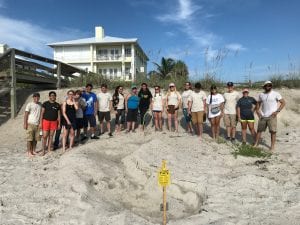
The Biology Summer Field Institute isn’t a field trip into the woods. For the week of July 17, rising high school juniors and seniors become real scientists. Led by Jennifer Elliott, Assistant Director of the UCF Arboretum, students were broken up into four groups: wetlands health assessment, forest ecology, vegetation monitoring, and gopher tortoise studies.
“This year we have 15 students from the five-county area, and one student came from Fort Lauderdale,” Elliott said. “We pair up the students with biologists who are professionals in their field and peer mentors who are either a current UCF undergrad, or a recent grad.”
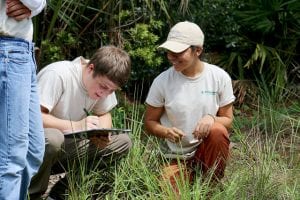 While the majority of the student’s time is spent learning how to collect samples in the field, and what biologists do, the structure of the institute is also about leadership. The mentorship levels are designed to allow high school students comfort in asking questions, while also giving UCF students and recent grads the chance to hone their own leadership skills.
While the majority of the student’s time is spent learning how to collect samples in the field, and what biologists do, the structure of the institute is also about leadership. The mentorship levels are designed to allow high school students comfort in asking questions, while also giving UCF students and recent grads the chance to hone their own leadership skills.
“They learn leadership, but they also learn field techniques,” Elliott said. “They aren’t just learning the diversity of Florida’s ecosystems, but also career opportunities. We have a strong focus on STEM (Science, Technology, Engineering and Math) degrees.”
The multi-faceted institute is just five days, but is packed full of information. The wetlands group visits three different cypress domes on campus and collects water samples to determine how urbanization changes the hydrology of those systems. Elliott says they analyze the water samples for small crustaceans and use accepted field standards to rate the heath of the system. Another variable they study are burned and unburned areas on campus. The vegetation monitoring group takes on that project, collecting data on the vegetation cover in different sites and analyzing those data back in the lab to measure differences between recently burned sites and sites that have never received prescribed fire.
“We are trying to teach them how important fire is to the ecology of Florida,” Elliott said. All of the groups talk about fire to some degree because fire is so important to the heath of Florida’s unique ecosystems. It drives everything about these systems.
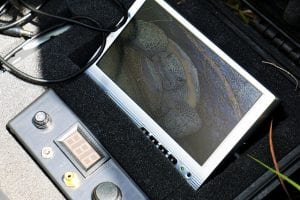
The gopher tortoise group may have the most fun gathering data while scoping out tortoise burrows. With the help of a professional they use a camera mounted on a long tube to peek into select burrows to see if they are occupied. This year they had a lot of fun because they got to show the other groups one of their tortoises.
“We found two tortoises this year,” Elliott said “The kids got to see a tortoise face and butt. Once they gather their data they use a formula developed by the Florida Fish and Wildlife Conservation Commission (FFWCC) to calculate the density of tortoise in the area.”
The students studying forest ecology bore into trees to assess their health. The only way to study a tree’s history is to cut it down, or bore through it with a drill. The students learned to read the tree rings to determine the age and trauma of trees using a magnifying glass in some cases.
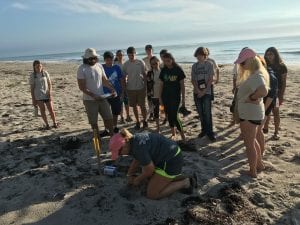
FWC-permitted research conducted by the UCF Marine Turtle Research Group, MTP-17-186B
There is also a trip out to the Atlantic coast, to the Barrier Island Center (BIC) in Melbourne Beach where the students learn about the ocean, dune and lagoon ecosystems. They also accompany UCF undergraduate and graduate researchers onto the nesting beach on the Archie Carr National Wildlife Refuge (ACNWR) to see nesting female sea turtles. The following morning they assist in the excavation of several nests to evaluate their reproductive success. The nests were laid 35 to 60 days earlier and successfully hatched the previous week. This allows the student to see the entire process from laying to hatching, giving them a deeper appreciation for the importance of these animals and their habitat. Plus, everyone loves hatchlings.
Once the students are finished gathering their data, Elliott has them create scientific posters with their findings that they present to their parents on the last day of the institute. She stresses that the institute isn’t all about biology – the students also have to practice communication skills. Elliott says in science it is important to be able to communicate data to the public. Scientist’s hard work is in vain if they can’t
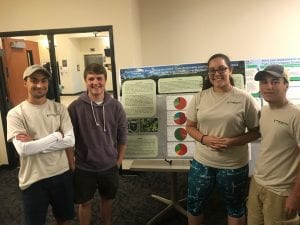
convince others of why it matters.
“This is not just a field trip. This is real science,” Elliott said. “Students have told me they love it because it isn’t pretend. And it’s not. We focus on a strong scientific method, and what scientists do. They collect real data and analyze and present those data, using computer software like Microsoft Excel and PowerPoint. They are practicing important computer skills and we are trying to show them the career opportunities available to them if they are interested in this kind of work.”
